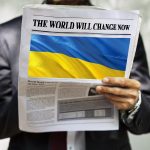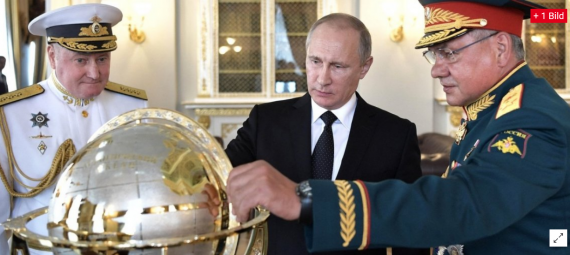Vladimir Putin and the old trauma of the collapse of the Eastern bloc.
by Kati Schneeberger – guest writer
No, it is not the “Ukraine crisis” or the “Russia-Ukraine conflict.” It is much more. This conflict is not just about one country in the very east of Europe, it is about all of Europe. Russian President Vladimir Putin has no problem with Ukraine, but with Europe and the pro-European attitude of the majority of people living in Ukraine.
Two fundamentally different ideas clash in this conflict. On the one hand, Putin’s thinking from the Cold War, including the existence of zones of influence, and, on the other hand, a new understanding of Europe that developed in the West after World War II and to which the eastern countries of Europe also subscribed after 1989. It is the understanding of a Europe in which sovereign states voluntarily join forces and cooperate in various areas on the basis of common values such as freedom, democracy and human rights.
That is not Putin’s thing at all. He wants absolute rule and unrestricted power, not only over today’s Russia, but also over all former Soviet republics and all countries once in the USSR’s sphere of influence – in other words, over half of Europe, including half of Germany. He expressed this idea impressively with his statement that the disintegration of the USSR was the greatest catastrophe of the 20th century, even though he tried to present himself as a “flawless democrat” in economically bad times for Russia. Some have bought this show in good faith and do not recognize his true intentions to this day.
Putin’s real enemy is not NATO, but Europe
Putin is still haunted by an old trauma that he experienced as a KGB agent stationed in the GDR around 1989: the collapse of the Eastern bloc. In doing so, he overlooks the fact that Europe has changed fundamentally since then and that the former countries of the Eastern Bloc also still carry a trauma with them. It’s just not the trauma of the collapse, but the trauma of the occupation period before that.
Putin’s real enemy is not NATO, as he is trying to portray it. His real enemy is Europe together with the idea of democracy, freedom and voluntary cooperation of independent states. NATO is much better suited as an enemy, however, because it is easier to accuse it of its own transgressions than Europe. In this way, the undecided and, above all, the opponents of the USA and NATO can be drawn to their own side much more easily in the propaganda war. If Putin were to attack Europe directly as an enemy, he could not divide and weaken it so easily. With a common enemy, however, some can be drawn to one’s own side, according to the motto: The enemy of your enemy is your friend.
NATO’s expansion was voluntary
This works especially well when NATO is also accused of what Russia itself lives by: expansion. More precisely: belligerent expansion. But there is exactly one aspect, which Putin and his propaganda of course deliberately conceals. NATO’s expansion has no warlike basis. Countries have joined it voluntarily. And, most importantly, countries can leave NATO voluntarily at any time. Putin’s ideas are quite different. He dreams of zones of influence and an expanded sphere of power from which the states and territories concerned could not unilaterally move out.
Crimea, parts of eastern Ukraine or Georgia are only the beginning. Putin wants more. To overcome his trauma, it needs a complete restoration of the old order. And that is why it is not a “Ukraine crisis” and not a “Russia-Ukraine conflict,” but a problem that affects all of Europe and that it must face together. We will not be able to protect our Europe and its achievements of the past decades entirely without a fight. The more resolutely we oppose Putin, the more likely we are to prevent a military struggle. To have peace in Europe, we must defend it together and resolutely.
ELfR Webinar invitation: Putin’s dangerous chess game: Ukraine, Europe and the West under attack
“Europe is not Putin’s personal chessboard on which he can move the pieces at will.”
Following the annexation of Crimea and military aggression in parts of eastern Ukraine, Russia’s President Putin is making far-reaching demands of NATO. If these are not met in full, Putin threatens military/technical consequences. The situation is escalating and a large-scale Russian invasion is becoming increasingly likely. This will not only affect Ukraine, but all of Europe. Europe must now show unity and strength. Events in the Ukraine conflict are unfolding almost hourly.
We have invited Kati Schneeberger, writer of this article and President of VIENNA goes EUROPE for an insightful evening on the situation in the Ukraine. Our European Liberals for Reform vice-President Piotr Azia will host this free webinar. Kindly register here: https://elfr-blog.eu/event/webinar-putins-dangerous-chess-game-with-ukraine-europe-and-the-west


About our guest writer:
Kati Schneeberger is a Green district councilor and European councillor in Vienna-Neubau, president of the association “Vienna goes Europe” and a teacher of history and political education.
Author Profile
-
Co-Founder of European Liberals for Reform
Chairperson of ELfR Working Group Health
ALDE Individual Members Steering Committee Member (2022-2023)
Social Media & Digital Marketing Expert, Blogger
Favorite Topics: Health, Society, LGBTQI
Latest entries
 Elections13/04/2022Presidential elections in France 2022
Elections13/04/2022Presidential elections in France 2022 Human Rights22/03/2022ELfR to support Manifesto for inclusive gender-based violence law
Human Rights22/03/2022ELfR to support Manifesto for inclusive gender-based violence law EU07/03/2022Five possible scenarios for the outcome of the Ukraine war
EU07/03/2022Five possible scenarios for the outcome of the Ukraine war Ukraine06/03/2022ELfR starts petition to nominate Volodymyr Zelenski for Sakharov Prize
Ukraine06/03/2022ELfR starts petition to nominate Volodymyr Zelenski for Sakharov Prize
Post Disclaimer
The opinions expressed by the author of this post do not necessarily represent the opinions and policies of ELfR.

